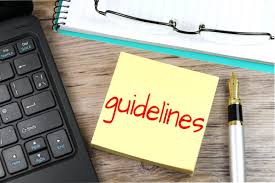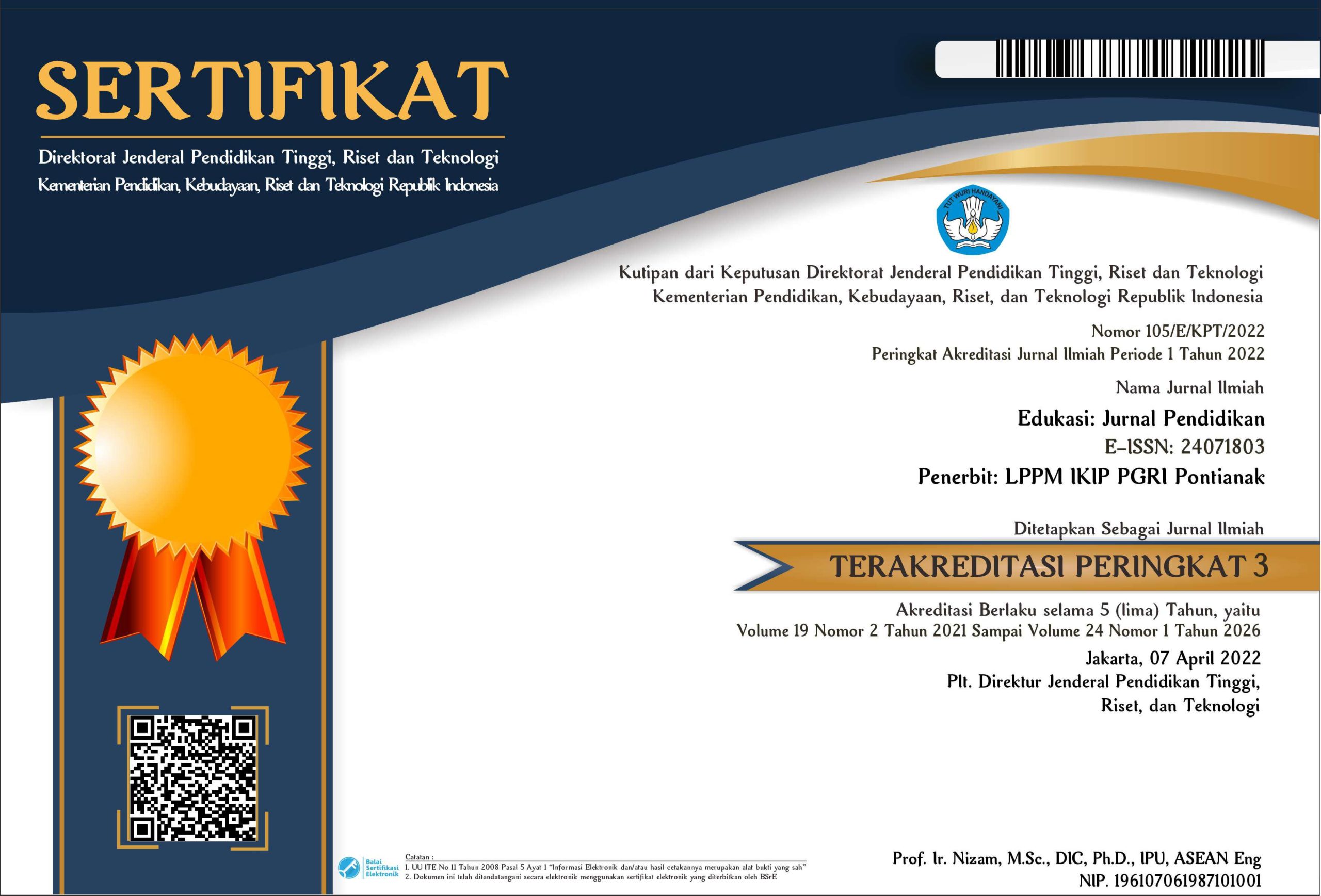Teaching Reading Comprehension by Using Experience-Text-Relationship Method to Senior High School Students
DOI:
https://doi.org/10.31571/edukasi.v18i2.1837Keywords:
Experience-Text-Relationship method, reading comprehension, English language teaching, metode Experience-Text-Relationship, pemahaman membaca, pengajaran Bahasa InggrisAbstract
Abstract
This research aimed to improve reading comprehension of public senior high school students by using Experience-Text-Relationship method. The research was done in two cycles and involved 31 eleventh-grade students of a public senior high school in SimpangDua, Ketapang in the Academic Year of 2018/2019. The researcher used observation field notes and reading tests to collect data of the study. A collaborator was involved during the observations and practices to build trustworthy of the study. The data from the observation field notes were analyzed qualitatively and the data from the reading test results were analyzed by using descriptive statistics. The analysis of the observation field notes shows that the students became active and polite, had high enthusiasm in the teaching and learning processes. The analysis of the reading test results also reveals that the students had improved their reading comprehension. In conclusion, Experience-Text-Relationship method can improve the students’ reading comprehension.
Â
Abstrak
Penelitian bertujuan untuk meningkatkan pemahaman membaca siswa SMA negeri menggunakan metode Experience-Text-Relationship. Penelitian ini menggunakan dua siklus dan melibatkan 31 siswa kelas sebelas siswa di salah satu SMA negeri di SimpangDua, Kabupaten Ketapang pada Tahun Akademik 2018/2019. Peneliti menggunakan catatan lapangan observasi dan tes membaca untuk mengumpulkan data penelitian. Seorang kolaborator dilibatkan selama pengamatan dan praktik untuk membangun penelitian yang dapat dipercaya. Data dari catatan lapangan observasi dianalisis secara kualitatif dan data dari hasil tes membaca dianalisis dengan menggunakan statistik deskriptif. Analisis catatan observasi lapangan menunjukkan bahwa siswa menjadi aktif dan sopan, memiliki antusiasme yang tinggi dalam proses belajar-mengajar. Analisis hasil tes membaca juga mengungkapkan bahwa terjadi peningkatan pemahaman membaca siswa. Kesimpulannya, metode Experience-Text-Relationship dapat membantu meningkatkan pemahaman membaca siswa.
Downloads
References
Ary, D., Jacobs, L. C., Razavieh, A., & Ary, D. 2010. Introduction to Research in Education (8th ed). Belmont: Wadsworth.
Au, K. H.-P. 1979. Using the Experience-Text-Relationship Method with Minority Children. Reading Teacher, 32(6): 677–679.
Aunurrahman, Hamied, F. A., & Emilia, E. 2017. A Joint Construction Practice in an Academic Writing Course in an Indonesian University Context. Celt (A Journal of Culture, English Language Teaching & Literature), 17(1): 27–44.
Burns, A. 2010. Doing Action Research in English Language Teaching: A Guide for Practitioners (1st ed.). New York: Routledge.
Burns, A., Westmacott, A., & Ferrer, A. H. 2016. Initiating an Action Research Programmefor University EFL teachers: Early Experiences and Responses. Iranian Journal of Language Teaching Research, 4(3): 55–73.
Creswell, J. W. 2012. Educational Research: Planning, Conducting, and Evaluating Quantitative and Qualitative Research (4th ed.). Lincoln: Pearson.
Deshpande, S. K. 2016. Activating Background Knowledge: An Effective Strategy to Develop Reading Comprehension Skills. Journal of English Language Teaching and Linguistics, 1(3): 191–202.
Emilia, E. 2012. Pendekatan Genre-Based dalam Pengajaran Bahasa Inggris: Petunjuk untuk Guru (2nd ed.). Bandung: Rizqi Press.
Fraenkel, J. R., Wallen, N. E., & Hyun, H. H. 2011. How to Design and Evaluate Research in Education (8th ed.). New York: McGraw-Hill Humanities/Social Sciences/Languages.
Jarmianik, J., Ngadiso, N., & Setyaningsih, E. 2013. Improving Reading Comprehension Using Experience-Text-Relationship (ETR) Method. English Education, 1(2): Abstract.
Lawrence, L. J. 2007. Cognitive and Metacognitive Reading Strategies Revisited: Implications for Instruction. Reading Matrix: An International Online Journal, 7(3): 55–71.
Lodico, M. G., Spaulding, D. T., & Voegtle, K. H. 2010. Methods in Educational Research: From Theory to Practice (2nd ed). San Francisco, CA: Jossey-Bass.
Miles, M. B. & Huberman, A. M. 1994. Qualitative Data Analysis: An Expanded Sourcebook (2nd ed.). Thousand Oaks: SAGE Publications, Inc.
Moore, P. J. 2013. An Emergent Perspective on the Use of the First Language in the English-As-A-Foreign-Language Classroom: An Emergent Perspective on the Use of the First Language. The Modern Language Journal, 97(1): 239–253.
Samosir, D. N. & Meisuri. 2013. Improving Students’ Reading Comprehension Achievement in Narrative Text Through Experience-Text-Relationship (ETR) Method. TRANSFORM Journal of English Language Teaching and Learning of FBS UNIMED, 2(2): 1–14.
Triani, F. & Jufri, J. 2018. Using Experience Text Relationship in Teaching Reading Recount Text to Senior High School’s Student. Journal of English Language Teaching, 7(4): 780–789.
Downloads
Published
How to Cite
Issue
Section
License
Authors who publish in this journal agree to the following terms:
- Authors retain copyright and grant the journal the right of first publication with the work simultaneously licensed under a Creative Commons Attribution License (CC-BY-NC) that allows others to share the work with an acknowledgment of the work's authorship and initial publication in this journal.
- Authors are able to enter into separate, additional contractual arrangements for the non-exclusive distribution of the journal's published version of the work (e.g., post it to an institutional repository or publish it in a book), with an acknowledgment of its initial publication in this journal.
- Authors are permitted and encouraged to post their work online (e.g., in institutional repositories or on their website) prior to and during the submission process, as it can lead to productive exchanges, as well as earlier and greater citation of published work.

 Download: 468
Download: 468


















